Izieu as Text
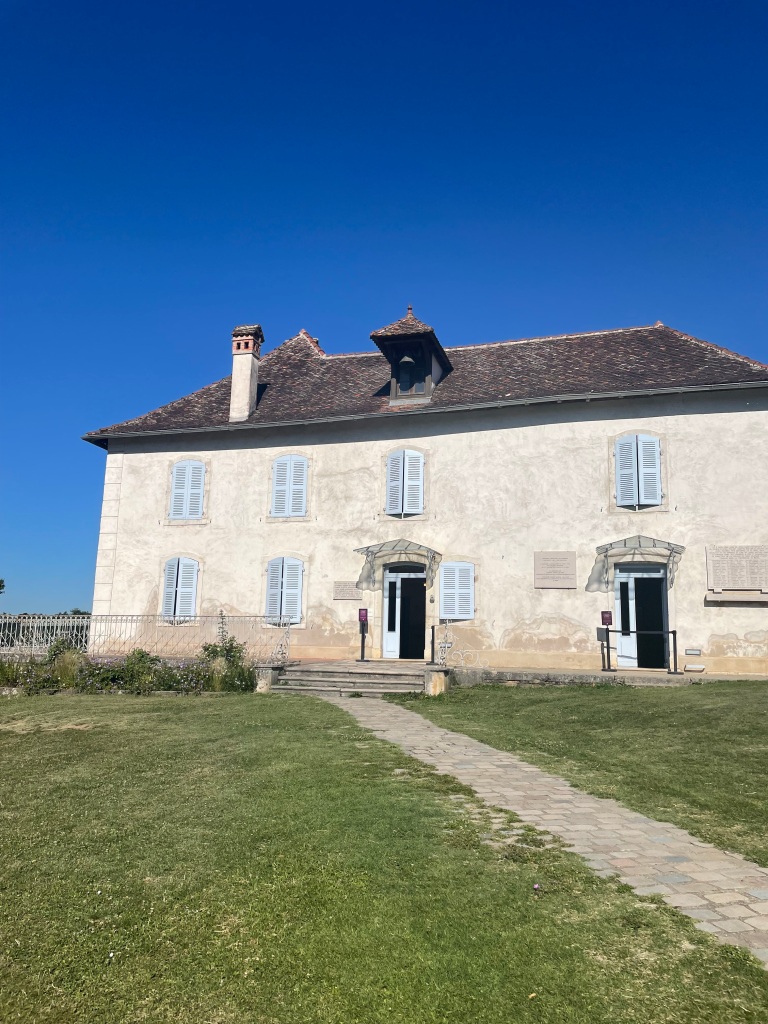

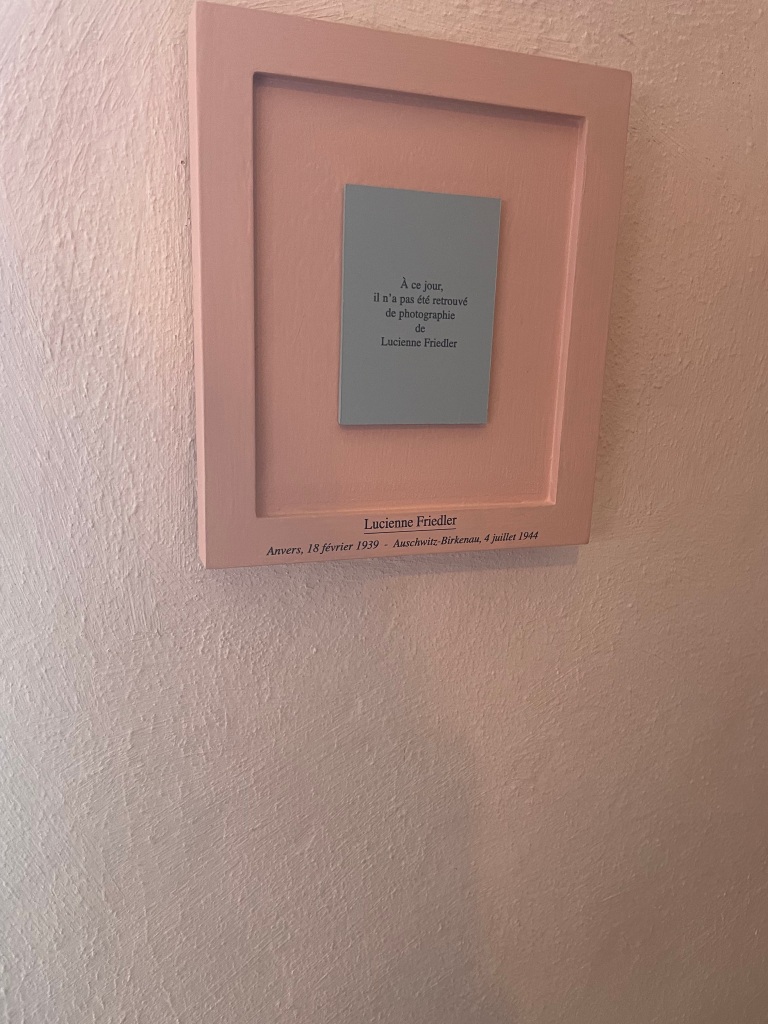
The Fallen Sanctuary
Hidden away in the French alps sits a beautiful house with a picturesque view of the surrounding mountains. Izieu is clearly beautiful but its incredible views are stained by tragedy. Following the surrender of France in World War Two Izieu was under the control of Italy. After the allied forces landed in southern Italy the German army moved into this region and the full weight of the holocaust came to the people of Izieu.
Throughout the occupation of France, many Jewish families sent their children to the countryside believing that it would be safer for them. Izieu was a prime candidate for refuge as the Italians were less oppressive than the Vichy and German governments, and many children were sent there as a result. As the German army took control of Vichy France and Italy they brought with them the SS and Klaus Barbie. Klaus Barbie, The Butcher of Lyon, was a man with nothing but evil in his heart. Every new piece of information I heard about this monster only increased the abhorrence I have for him. On April 6th, 1944 the Gestapo under the command of Klaus Barbie went to Izieu and kidnapped the children who were living there at the time. Of the 44 children taken none survived.
Izieu for a period of time provided a refuge where these children could simply be children even while the world around them was falling apart. The children attended classes, drew pictures, and even wrote to their parents during this time. While this attempt at providing a normal life is admirable and shows the good people can do, it’s impossible to leave the memorial without a bitter taste. The cruelty of man is displayed on a grand scale. How can anyone let alone a father sentence 44 children to death? One of the most upsetting aspects of this was that justice was not served until 1987 more than forty years after his crimes. The reason for this is that Barbie was protected by the US government which used him as an anti-communist agent. How many war criminals have the US protected for its own gain?
This memorial makes you question the nature of man. Clearly, there are good people in this world, the ones who helped these children live a semi-normal life, but there is also evil, those who condemned children to death for simply being Jewish. Simply hearing the letters written by these children was enough to bring a class of 20 to tears, the fact a man sentenced all these children to death is harrowing. We as humans allowed this particular brand of hate to survive and expand for years before the allied powers worked together to stop it, but even the allies were contributors to its reign. The French with their “Strange Defeat” and the hiring of Nazis by the Americans and British after the war. Morality was abandoned by these countries when they sensed the possibility of personal gain. Who is brave enough to trust others when humans have such a large capacity for evil?
Lyon as Text

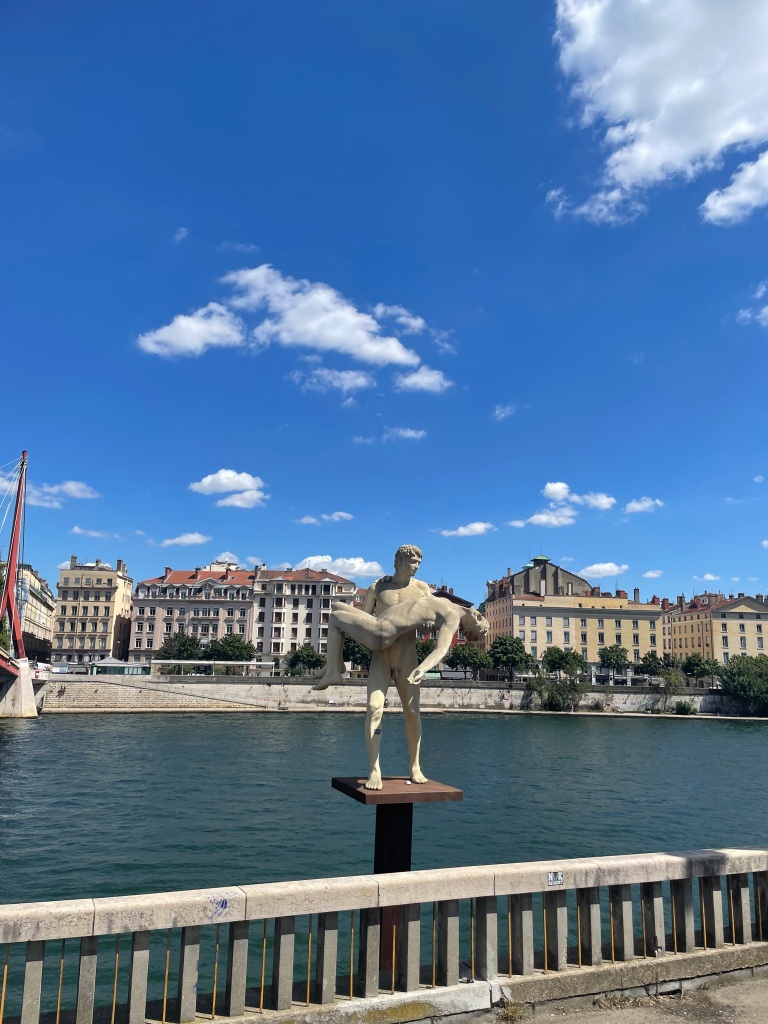

A City Through Time
The allure of Paris is known across the world, the eiffel tower is one of the most famous buildings ever constructed and can be seen on hundreds of movie posters, albums, and family photos. In my opinion, while beautiful, Paris fails to hold up to the city of Lyon. Lyons history has been preserved within its architecture. Many cities simply destroy older buildings when they feel the need to expand, Lyon is different they expand eastwards. Lyons eastward expansion has created a perfect picture of its history.
Lyons history starts with its founding by the Romans. Lyon was a very important city for the Romans, acting as the capital of the province of Gaul. Lyon was founded on previously unsettled land, something that was unusual for the Romans to do outside of Italy, but the strategic location of the city between the Saone and Rhone rivers was too good to ignore. Roman influence can still be found in Lyon with a large Roman theater on a nearby hill. The Roman history of Lyon can also be seen in a speech delivered by former Roman emperor Claudius advocating for those outside of Italy to be treated fairly as Romans, this speech is preserved on a tablet in Lyon.
Moving past antiquity the medieval world of Lyon can be seen. The buildings look to be emerging from the ground with a pinkish stone, and with small statues of Mary watching over you as you go into unknown areas. It is in this section of Lyon that its most incredible feature becomes apparent, traboules. Traboules are like secret passageways that help to link the streets of old Lyon, while many traboules are private property there are still numerous passageways open to public use (provided you stay quiet). It would take hundreds of pages to fully explain the history of these traboules and all of their historical uses from their role in the french resistance to the location of the first workers’ revolt. Even the metro lines show how Lyon has evolved as a city becoming more modern the further east you go.
The city of Lyon is organized like a book; you can read it as you explore. Being able to see the division of time from one block to the next makes Lyon a city that any historian would love.
Paris as Text


The Parisian American Exchange
The United States and France have always shared a special relationship, while this relationship originally stemmed from their mutual dislike of the British it became something more. Some of the most important figures in American history and culture have called France, more specifically Paris, home. What is it that makes this connection so strong, why have so many famous Americans resided in Paris? To understand this American-Parisian connection we must understand the two major time periods that influential Americans lived in Paris long term.
The first period in which Americans found themselves in Paris was the late 18th century. During this period we had many founding fathers such as Benjamin Franklin, Thomas Jefferson, and John Adams living in Paris. The primary reason for this first batch of influential Americans was diplomatic. Franklin frequently met with Louis XVI and Marie Antoinette to gain support for the American revolution. After receiving French support and the later signing of the Treaty of Paris 1783 officially ending the Revolutionary war many of the Americans in Paris returned to America to begin governing, however, some stayed and impacted French history. Thomas Paine is a great example of an American who remained in Paris, he was an avid supporter of the French revolution and even wrote a pamphlet “Rights of Man” which supported the French Revolution. Paine in many ways marks the exchange of ideas between the two countries with other examples being Voltaire’s initiation into the FreeMasons by Franklin and the establishment of an Institute of Science in America.
The second time period when Americans flocked to Paris is in the 20th Century. This period was focused on cultural exchange, due to this many of the famous Americans who lived in Paris at this time were involved in the arts. The most famous example during this time is Ernest Hemingway. Paris was popular with various artists for many reasons in this period. Paris, and France as a whole, was more accepting of the LGBT community and did not have segregation like in the United States. These factors made Paris very attractive to Americans such as Gertrude Stein and Josephine Baker. Paris was a place where one could unapologetically be themselves in a time when the United States was punishing people for just that.
As I study history the realization of France’s importance to America only continues to grow. American ideals are in many ways based on the French, Voltaire, Rousseau, and Montesquieu shaped the American government and their ideas were brought back by the first wave of Americans in Paris. The second wave of Americans were able to express their creativity in a safe environment and greatly advanced American culture. Many of the ideals that I hold are simply borrowed from the French. Without the social freedoms of Paris, I would not be who I am. With the United States continuing down a path of weakening individual freedoms I can not help but wonder if another generation of Americans will flee to Paris. If another wave of Americans truly does come to Paris, what will they bring with them this time, diplomacy, culture, or something else entirely?
Versailles as Text
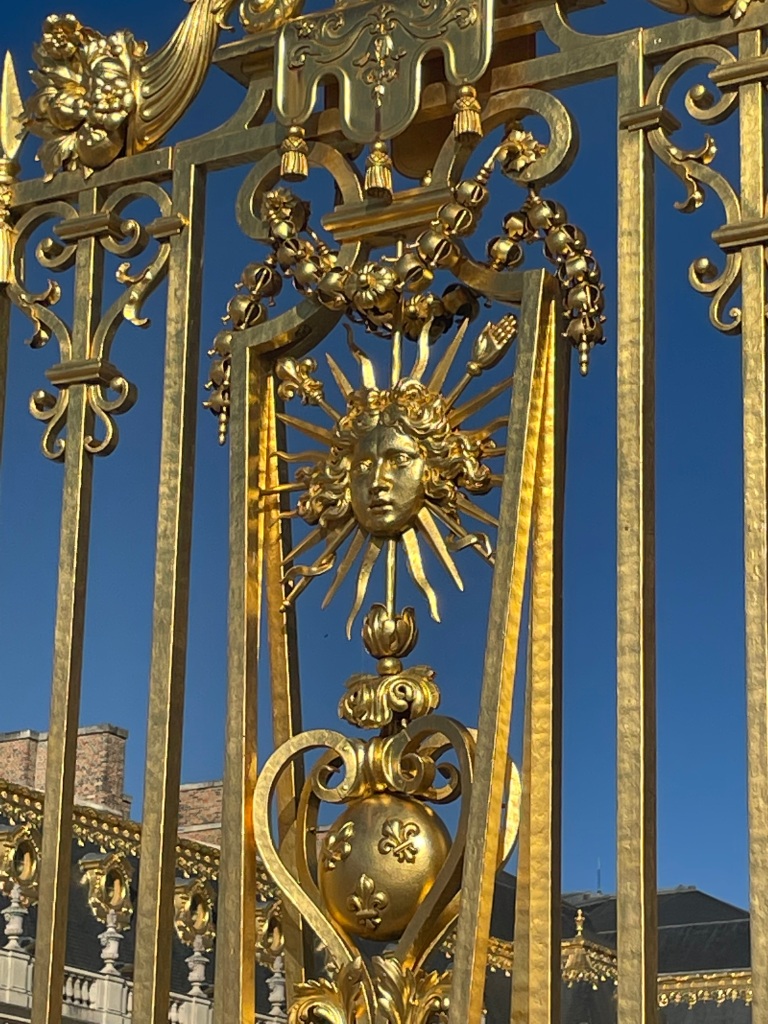
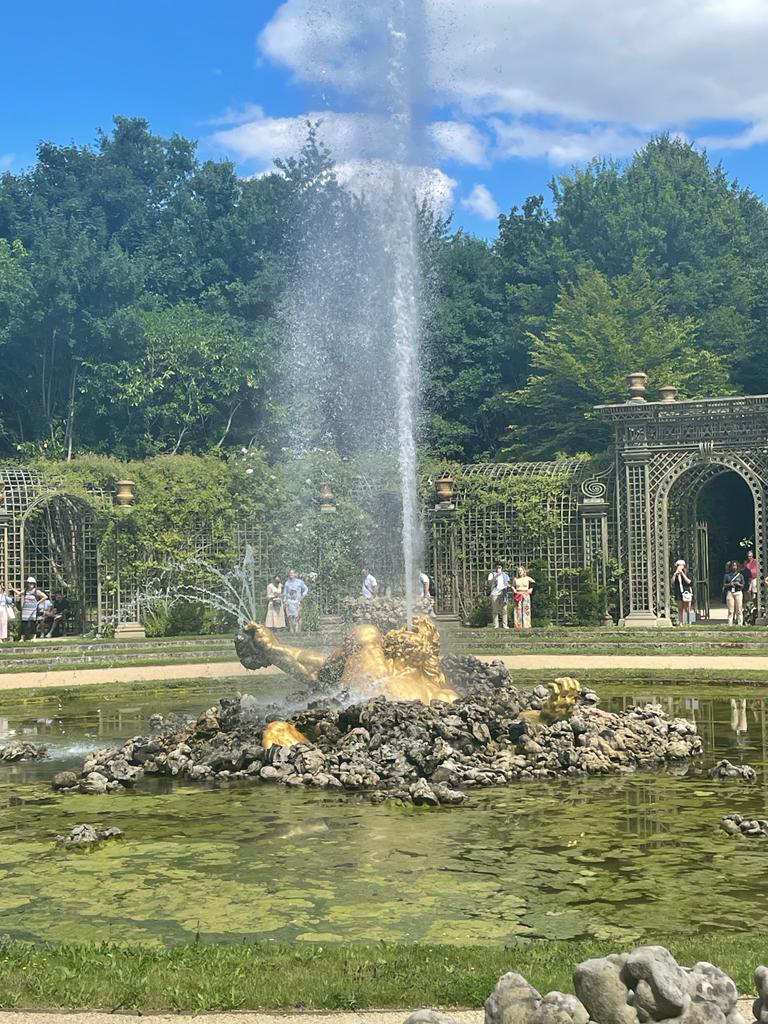

Beauty or Pain
The Sun King, Louis the Great, King of France, and Navarre, arguably the most successful king in French history and the pinnacle of absolute monarchy, all these titles belong to the same man Louis XIV. While these titles may seem grand I can assure you, that they are modest compared to his house, The Palace of Versailles. Versailles is not simply big it is colossal, with 2,300 rooms the place was able to sleep 3000 and host parties with up to 20,000 people in attendance. Versailles was not always the gold-plated behemoth we see today it was once upon a time a hunting lodge built by Louis XIII.
Louis XIV was a cruel man, he waged constant wars and let his people starve to fund his vanity projects. Louis XIV started France down its spiral of debt that led to the execution of the future king roughly 80 years after his reign. Versailles was not just expensive it was a huge economic strain on the French state at some points consuming 25% of the French income. It is clear that the building of Versailles caused the death and suffering of many French citizens. Does the pain Versailles caused discredit its beauty or can we separate the two?
There is one key aspect that helps to separate Versailles’ beauty from the pain it caused and that is time. The people who starved due to the building of Versailles lived more than 300 years ago. I have no emotional attachment to the French people of the 17th century. This large gap in time makes Versailles less problematic. Anyone who was alive during the building of Versailles may have seen the palace in a negative light. Aside from the death, it caused some may have issues with Versailles due to Louis XIV himself. It’s not hard to see how he could be a controversial figure. Personally, I do not find it difficult to separate the artist or visionaries from their creations. All people are flawed, everything has a less than perfect past, but that does not mean it is not beautiful.
References
https://en.chateauversailles.fr/discover/estate/palace#:~:text=Today%20the%20Palace%20contains%202%2C300%20rooms%20spread%20over%2063%2C154%20m2. https://www.pbs.org/marieantoinette/life/index.html#:~:text=Actual%20building%20costs%20for%20Versailles,a%20maximum%20cost%20of%20%24299%2C520%2C000%2C000
Normandy as Text

Bravery in its Purest Form
Theodore Roosevelt Jr, a name that sounds eerily familiar. Roosevelt was born in 1887 and was the son of former President Theodore Roosevelt. Theodore Jr was truly a man who lived his life to the fullest, being involved in business, politics, and the military before his death in 1944, just a month after D-day.
Being the namesake of Theodore Roosevelt was not an easy task and throughout his childhood and life as a whole Theodore jr wrestled with those monstrous expectations. These expectations can be seen in the college he attended, going to Harvard, his father’s alma mater instead of West Point or Annapolis which he was interested in.
After graduating from Harvard in 1909 Roosevelt became successful in the business world working in banking. Despite his success, Roosevelt still wanted to serve his country and in 1915 he was able to. In 1915 Roosevelt took part in a camp to help prepare men to become military officers, and two of his three brothers joined him. Due to this camp when the United States entered the war Roosevelt joined as a Major. While Roosevelt’s greatest accomplishments were in World War 2 there were significant events that are important to understanding Roosevelt. Roosevelt was one of the first to volunteer to go to the western front, when he arrived and saw the living conditions bought his entire battalion new combat boots with his own money (battalions can be as large as 1,000 people). In this first instance, you can see exactly what kind of leader and man Roosevelt was. Roosevelt earned a few medals during his time in the war such as the Croix de Guerre, this shows that Roosevelt’s bravery and heroism were recognized by all. Finally, this last event shaped the rest of Roosevelt’s life, he was shot in the leg and while he survived without the need for amputation he would walk with a cane for the rest of his life.
After World War I Roosevelt followed in his father’s footsteps and got involved in politics. The most important positions he held were Governor of Puerto Rico and later Governor of the Philippines. Roosevelt was the first American Governor of Puerto Rico to try to learn Spanish, learning at least 20 words a day. During his time as Governor (in both locations), Roosevelt was well received and liked by his constituents easing poverty and encouraging investment. After the election of FDR in 1932, Roosevelt withdrew from politics.
When the United States entered World War 2 Roosevelt was placed in a more administrative position, but he quickly requested to return to a combat unit in 1941. Roosevelt took part in the African campaign and was promoted to Brigadier General before being removed from his division and being sent to England. Omar Bradley was the one who removed Roosevelt from his post and wrote in his autobiography that Roosevelt was removed for “loving their division too much.” While in England Roosevelt helped to plan D-Day and he repeatedly requested to join the men in the first landing party. Roosevelt’s request was rejected twice before his petition was finally accepted. Roosevelt felt that his presence on the beaches would calm the men. Among the first to land on Utah beach and the highest ranked, Roosevelt and his men were about a mile off course, upon hearing this Roosevelt famously said “We’ll start the war from right here!” During the ensuing battle, Roosevelt walked around the front with his cane while under enemy fire telling stories of his father and reading poetry to the men. After the success of D-day and Roosevelt’s outstanding leadership and bravery, a promotion was in the works, but Roosevelt died of a heart attack just 5 weeks later.
Theodore Roosevelt Jr’s sacrifice was immense, this was a man who went out of his way to serve his country and constantly put himself in danger to do it. Using the Roosevelt name he most likely would have been able to avoid service in WW1 altogether. During World War II he re-enlisted while needing a cane to walk and hiding heart issues. The love Roosevelt had for his fellow man is clear by his actions and his bravery was and is unmatched. Roosevelt is an inspiration to me, since a young age he was burdened with the lofty expectations that came with his name, throughout his life he constantly met and exceeded them. I can almost guarantee that I would not have been able to act with the same bravery as him, but I hope when I die I will be remembered as someone who cared for others just as Roosevelt is.
References
Theodore Roosevelt, Jr. [2 September date received] Photograph. Retrieved from the Library of Congress, <www.loc.gov/item/2017679403/>.
“Theodore Roosevelt Jr.: World War II: U.S. Army: Medal of Honor Recipient.” Congressional Medal of Honor Society, https://www.cmohs.org/recipients/theodore-roosevelt-jr.
“Theodore Roosevelt Junior during the Battle of Normandy.” Musée Mémorial De Bloody Gulch, https://museebloodygulch.com/theodore-roosevelt/?lang=en.
“Theodore Roosevelt, Jr. (U.S. National Park Service).” National Parks Service, U.S. Department of the Interior, https://www.nps.gov/people/theodore-roosevelt-jr.htm.
Lachaise as Text

Defining Liberty
“For forty years I have defended the same principle: freedom in everything, in religion, in philosophy, in literature, in industry, in politics-and by freedom I mean the triumph of the individual”(Benjamin Constant). What does freedom mean to you? Freedom is a concept that is very important to the American populace, but we rarely take time to establish what it means. Freedom is something we just assume everyone knows and feels the same about. Benjamin Constant is someone who asked himself that question and came up with an answer.
The French Revolution was a time where liberty seemed to be expanding, the decriminalization of homosexuality, the abolition of slavery, and so much more. Shortly after this great victory for liberty things turned ugly, the reign of terror began, something that seems to contradict the egalitarian principles championed by these same people just months prior. How could these two extremes exist in the same society? Benjamin Constant believed it was because of our definition of what liberty is and its role in society.
Benjamin Constant was born in Switzerland to descendants of French huguenots in 1767. The Huguenots were a group of French protestants that followed the teachings of John Calvin; they were expelled from France after the Edict of Nantes was revoked. Constant was only able to obtain French nationality in 1790 when a law giving civil rights to descendants of those exiled from religious beliefs was passed. This instant shows some of the success of the French revolution, the meritocratic and secular nature of the movement in its early days allowed for those who had the ability to change French history participate in its government.
While known for his political philosophy Constant was also an accomplished novelist and politician. Constant had many spells in French politics surrounding the Napoleonic regime, first appointed by Nepoleon to the Tribunat in 1800 before being removed in 1802. Napoleon brought Constant back into government in 1815 in a more important advisory role as a member of the council of the state. After Napoleon’s hundred days Constant was elected to the council of deputies and was a member from 1819 until his death in 1830. Perhaps the most important period of his poltical career was the shortest, during the hundred days Constant had a more influential role drafting policy and being able to implement some of his ideas, drafting the Acte Additional which made Napoleon a constitutional monarch. Constants poltical theories really spread after his death with his ideas for a monarch with only “moderating powers” being implemented in Brazil, Portugal, and in some regions of Italy.
To understand Constant it is important to know his beliefs, there are two important aspects of his political theroy to undertsand, his views on liberty and seperation of powers. While less important his view on separation of powers is interesting, contrary to Montesquieu and his three branches, Constant believed in five. The five branches of government he proposed are the Monarch/Moderator, the Executive, the Representative Power of Opinion, the Representative Power of Tradition, and the Judiciary. In this system the Monarch would exist outside of government but be able to appoint the ministers which made up the Executive branch, the executive branch would function with multiple ministers making up the head of state, the two representative branches would represent the opinion of the masses and the other would be hereditary, and finally the judicial branch would be similar to the way we view it today.
Constants most important contribution to political philosophy was his views on liberty. Constant makes a clear distinction between ancient and modern liberty. Ancient liberty is that which was present in the Greek city states and is based on the right to participate in the state, but requires subordination to it. Ancient liberty required a small state, a homogenous society, slavery, and warfare to succeed. Modern liberty on the other hand was based on personal freedom, freedom from the state. Modern liberty works for the modern state with a large territory, no slavery, and focuses on mercantilism. This Modern liberty is how I view liberty today, private affairs are not governmental matters and Constant would agree.
Constant risked his life for what he believed, he critized the Jacobins, Napoleon and later Charles X. He believed the Revolution was attempting to make ancient liberty fit a modern state, and that was the root of their failures. he disagreed with the Jacobins but did not think the were crazy like many critics of the time. He fought against Napoleons imperialism and denounced French colonialism and advocated for the rights of non-white colonial subjects.
I personally would not have been able to openly critize any of those groups out of fear of death. Revolutionairies and monarchs are not known for their openess to criticism. Constants belief for the ultimate freedom of the individual is something that I believe in strongly, and is something that is incredibly important to both our class and modern day America. It has been said multiple times that the United States and France exist on a pendulum with periods of great liberty and periods of decline. We are currently in a period of decline which makes Constant and his ideals more relevant today than ever before.
References
“Benjamin Constant De Rebecque (1767-1830).” Musée Protestant, 14 Dec. 2020, https://museeprotestant.org/en/notice/benjamin-constant-de-rebecque-1767-1830/.
“Benjamin Constant.” Encyclopædia Britannica, Encyclopædia Britannica, Inc., https://www.britannica.com/biography/Benjamin-Constant.
Laursen, John C, and Anne Hofmann. “Benjamin Constant on the Self, Religion and Politics: An Introduction.” Historical Reflections, vol. 28, 2002, pp. 311–319.